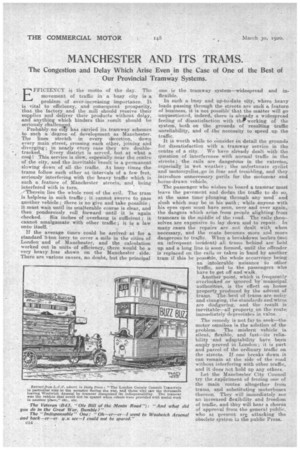MANCHESTER AND ITS TRAMS.
Page 8

If you've noticed an error in this article please click here to report it so we can fix it.
The Congestion and Delay Which Arise Even. in the Case of One of the Best of Our Provincial Tramway Systems.
EFFICIENCY iS the motto of the day. The movement of traffic in a busy city is a problem of ever-increising importance. It is vital to efficiency, and consequent prosperity, that the factory and the mill should receive their supplies and deliver their products without delay, and anything which hinders this result should be seriously challen&ed.
Probably no ciTy has carried its tramway schemes to such a degree of development as Manchester. The lines stretch in every direction, . down every main street., crossing each other, joining and diverging; in nearly every case they are double tracked. Every district is served, but at what a cost! This service is slow, especially near the centre of the city, and the inevitable result is a permanent slowing down of all the traffic. At busy times the trams follow each other at intervals of a few feet, seriously interfering with the heavy traffic which is such a feature of Manchester streets, and being interfered with in turn.
Therein lies the whole root of the evil. The tram is helpless in sifeh traffic ; it cannot. swerve to pass another vehicle ; there is no give and take possible ; it must wait until its unalterable course is clear, and then ponderously roll forward until it is again checked. Six inches or overhang is sufficient; it cannot amalgamate with other traffic ; it ig a law unto itself. ' . . .
If the average times 'could be arrived at for a standard 3-ton lorry to cover a mile in the cities of. London and of Manchester, and the calculation worked out in units of efficiency, there would be a very heavy loss shown on the Manchester side. There are various causes, no doubt; but the principal
one is the tramway system—widespread and in flexible.
In such a busy and up-to-date city, where heavy loads passing through the streets are such a feature of business, it is not possible that the matter will go unquestioned, indeed, there is alr'sady a widespread feeling of dissatisfaction with thir working of the system, both on the grounds of resulting traffic unreliability, •and of the neceasity to speed up the traffic.
It is worth while to consider in detail the grounds for dissatisfaction with a tramway service in the centre of a city. We have already dealt with the question of interference with normal traffic in the streets ; the rails are dangerous in the extreme, especially in wet weather ; the unfortunate cyclist and motorcyclist,go in fear and trembling, and they introduce unnecessary perils for the motorcar and horse-drawn vehicle.
The passenger who wishes to board a tramcar must leave the pavement and dodge the traffic to do so, at the same time plunging through any mud and slush which may be in his path ; while anyone with his eyes open must have seen, over and over again, the dangers which arise from people alighting from tramcars in the middle of the road. The rails themselves are expensive to lay down and to repair. In many cases the repairs are not dealt with when necessary, and the route becomes more an morn dangerous to traffic. When a breakdown °can's (not an infrequent incident) all trains behind are held up. and a long line iS soon formed, until the offender is replaced on the rails or taken in hand by another tram if this be possible, the whole occurrence being
an intolerable nuisance to other traffic, and to the passengers who have to get off and walk. •
Another point, which is frequently overlooked or ignored by-municipal authoritieS, is the effect on house property produced by the advent or trams. The .best of trams are noisy and clanging, the standards and wires are disfiguring, and the result is inevitable—all property on the route immediately depreciates in value.
The remedy is not far to seek—the motor omnibus is the solution of the problem. The modern vehicle is silent, flexible, and fast—its reliability 'and adaptability have been amply proved in London ; it is part and parcel of the ordinary traffic on the streets. If one breaks down it can remain at the side of the road without interfering with other traffic, and it does not hold up any others.
Let. the Manchester' City Council try the exp-kiment of freeing one of the main routes altogether from trams, and substituting motorbuses thereon. They will immediately see an increased flexibility and freedom of traffic, and they will hear a chores of approval from the general public, who at present ar: attacking the obsolete system in the public Press.


























